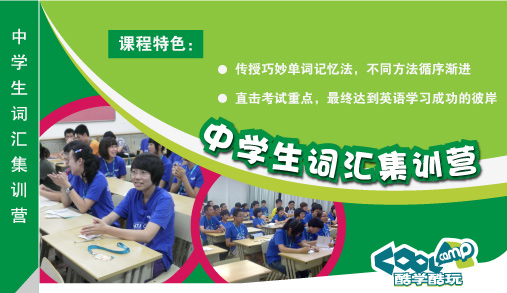英语常见的修辞格
来源:本站原创 点击率: 发布: 2013-2-20
上海新东方酷学酷玩夏令营分享英语学习资料:
figures of speech (修辞)are ways of making our language figurative. when we use words in other than their ordinary or literal sense to lend force to an idea, to heighten effect, or to create suggestive imagery, we are said to be speaking or writing figuratively. now we are going to talk about some common forms of figures of speech.
1) simile:(明喻)it is a figure of speech which makes a comparison between two unlike elements having at least one quality or characteristic (特性)in common. to make the comparison, words like as, as...as, as if and like are used to transfer the quality we associate with one to the other. for example, as cold waters to a thirsty soul, so is good news from a far country.
2) metaphor:(暗喻)it is like a simile, also makes a comparison between two unlike elements, but unlike a simile, this comparison is implied rather than stated. for example, the world is a stage.
3) analogy: (类比)it is also a form of comparison, but unlike simile or metaphor which usually uses comparison on one point of resemblance, analogy draws a parallel between two unlike things that have several common qualities or points of resemblance.
4) personification: (拟人)it gives human form of feelings to animals, or life and personal attributes(赋予) to inanimate(无生命的) objects, or to ideas and abstractions(抽象). for example, the wind whistled through the trees.
5) hyperbole: (夸张) it is the deliberate use of overstatement or exaggeration to achieve emphasis. for instance, he almost died laughing.
6) understatement: (含蓄陈述) it is the opposite of hyperbole, or overstatement. it achieves its effect of emphasizing a fact by deliberately(故意地) understating it, impressing the listener or the reader more by what is merely implied or left unsaid than by bare statement. for instance, it is no laughing matter.
7) euphemism: (委婉) it is the substitution of an agreeable or inoffensive(无冒犯) expression for one that may offend or suggest something unpleasant. for instance, we refer to "die" as " pass away".
8) metonymy (转喻) it is a figure of speech that has to do with the substitution of the mane of one thing for that of another. for instance, the pen (words) is mightier than the sword (forces).
9) synecdoche (提喻) it is involves the substitution of the part for the whole, or the whole for the part. for instance, they say there's bread and work for all. she was dressed in silks.
10) antonomasia (换喻)it has also to do with substitution. it is not often mentioned now, though it is still in frequent use. for example, solomon for a wise man. daniel for a wise and fair judge. judas for a traitor.
11) pun: (双关语) it is a play on words, or rather a play on the form and meaning of words. for instance, a cannon-ball took off his legs, so he laid down his arms. (here "arms" has two meanings: a person's body; weapons carried by a soldier.)
12) syllepsis: (一语双叙) it has two connotations.
in the first case, it is a figure by which a word, or a particular form or inflection of a word, refers to two or more words in the same sentence, while properly applying to or agreeing with only on of them in grammar or syntax(句法). for example, he addressed you and me, and desired us to follow him. (here us is used to refer to you and me.)
in the second case, it a word may refer to two or more words in the same sentence. for example, while he was fighting , and losing limb and mind, and dying, others stayed behind to pursue education and career. (here to losing one's limbs in literal; to lose one's mind is figurative, and means to go mad.)
13) zeugma: (轭式搭配) it is a single word which is made to modify or to govern two or more words in the same sentence, wither properly applying in sense to only one of them, or applying to them in different senses. for example, the sun shall not burn you by day, nor the moon by night. (here noon is not strong enough to burn)
14) irony: (反语) it is a figure of speech that achieves emphasis by saying the opposite of what is meant, the intended meaning of the words being the opposite of their usual sense. for instance, we are lucky, what you said makes me feel real good.
15) innuendo: (暗讽) it is a mild form of irony, hinting in a rather roundabout (曲折)way at something disparaging(不一致) or uncomplimentary(不赞美) to the person or subject mentioned. for example, the weatherman said it would be worm. he must take his readings in a bathroom.
16) sarcasm: (讽刺) it sarcasm is a strong form of irony. it attacks in a taunting and bitter manner, and its aim is to disparage, ridicule and wound the feelings of the subject attacked. for example, laws are like cobwebs, which may catch small flies, but let wasps break through.
17) paradox: (似非而是的隽语) it is a figure of speech consisting of a statement or proposition which on the face of it seems self-contradictory, absurd or contrary to established fact or practice, but which on further thinking and study may prove to be true, well-founded, and even to contain a succinct point. for example more haste, less speed.
18) oxymoron: (矛盾修饰) it is a compressed paradox, formed by the conjoining(结合) of two contrasting, contradictory or incongruous(不协调) terms as in bitter-sweet memories, orderly chaos(混乱) and proud humility(侮辱).
19) antithesis: (对照) it is the deliberate arrangement of contrasting words or ideas in balanced structural forms to achieve emphasis. for example, speech is silver; silence is golden.
20) epigram: (警句) it states a simple truth pithily(有利地) and pungently(强烈地). it is usually terse and arouses interest and surprise by its deep insight into certain aspects of human behavior or feeling. for instance, few, save the poor, feel for the poor.
21) climax: (渐进) it is derived from the greek word for "ladder" and implies the progression of thought at a uniform or almost uniform rate of significance or intensity, like the steps of a ladder ascending evenly. for example, i came, i saw, i conquered.
22) anti-climax or bathos: (突降)it is the opposite of climax. it involves stating one's thoughts in a descending order of significance or intensity, from strong to weak, from weighty to light or frivolous. for instance, but thousands die, without or this or that, die, and endow(赋予) a college, or a cat.
23) apostrophe: (顿呼) in this figure of speech, a thing, place, idea or person (dead or absent) is addressed as if present, listening and understanding what is being said. for instance, england! awake! awake! awake!
24) transferred epithet: (转类形容词) it is a figure of speech where an epithet (an adjective or descriptive phrase) is transferred from the noun it should rightly modify(修饰) to another to which it does not really apply or belong. for instance, i spent sleepless nights on my project.
25) alliteration: (头韵) it has to do with the sound rather than the sense of words for effect. it is a device that repeats the same sound at frequent intervals(间隔) and since the sound repeated is usually the initial consonant sound, it is also called "front rhyme". for instance, the fair breeze blew, the white foam flew, the furrow followed free.
26) onomatopoeia: (拟声) it is a device that uses words which imitate the sounds made by an object (animate or inanimate), or which are associated with or suggestive(提示的) of some action or movement.
selected from figures of speech by feng cuihua
阅读上一篇:动词suggest的用法详解
阅读下一篇:没有了

- 上海新东方中学生词汇集训营 上海新东方推出的“酷学酷玩·快乐记单词词汇风暴营”以科学的词汇学习法和记忆法为学员的英语学习夯下坚实的基础。词汇是基础,是……

- 上海酷学酷玩英语提分全能营 口语课:学英语,就其本质来讲,是一门实践课,要学好英语,就必须在口语会话等方面有所熟练, 能够流利地用英语进行交谈, 听懂英语。 ……

- “酷学酷玩”新概念精品夏令营 “新概念精品营”从新概念教材本身出发,选取精华的篇章、段落进行重点细致的剖析与讲解。亦从听力、口语、文化等各方面,让学员全……

- “酷学酷玩”申城英语游学夏令营 暑期相聚上海,走进华东百年名校,感受申城都市魅力;上海酷学酷玩为青少年设计的励志类户外体验式培训活动,帮助学员方法梦想,在……

- “酷学酷玩”e计划听力口语夏令营 面对林林总总的暑假方案,你是否有“乱花渐欲迷人眼”的感觉?怎样贴心的安排才能既满足你爱玩的天性, 又得到潜移默化的熏陶和锻炼……
 酷学酷玩夏令营热报线路更多>>
酷学酷玩夏令营热报线路更多>> 最新动态更多>>
最新动态更多>>
 当前位置:
当前位置:

